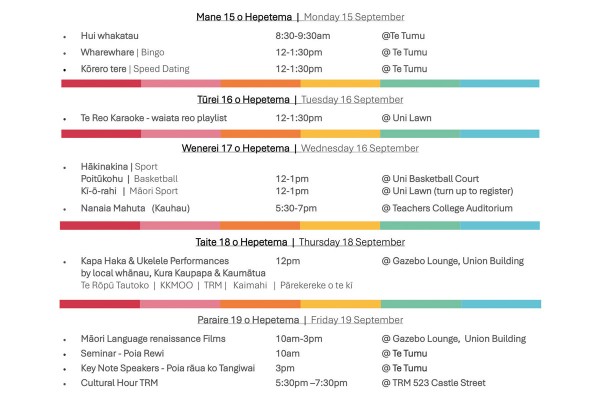Te Wiki o Te Reo Māori has reached its golden jubilee, celebrating 50 years of advocating for Aotearoa’s native language. This year's byline is ‘ake ake ake’ – a forever language. It’s a huge occasion for pride and community-building for many on the University of Otago campus; here’s what Te Wiki o Te Reo Māori means for many tauira.
Kiritea Smith, Project Manager at the Office of Māori Development, told Critic Te Ārohi that she’s been fortunate to witness “significant growth” in the presence and use of te reo Māori on campus. There’s been a “noticeable increase” in demand for Māori translations across staff, departments, offices, and divisions, according to Kiritea. “Importantly, all translations are completed in both generic reo Māori and the Kāi Tahu dialect – recognising te reo Māori nationally while also honouring the local identity of our Dunedin campus.”
A milestone moment in the University’s commitment to honouring Te Tiriti was the unveiling of their new tohu and ikoa Māori last year, Ōtākou Whakaihu Waka. The project involved extensive consultation and collaboration between the University, mana whenua, tauira Māori, and kaimahi Māori. “It has been a long time coming in acknowledging mana whenua and te iwi Māori within the walls of the University. I feel positive about the approach the University is taking in being Treaty-led,” said Kiritea. Kare Tipa, Project Manager Toitū Te Reo Māori at the University, agreed, pointing out that the commitment is now more visible than ever with the addition of Māori design art and signage.
Kiritea told Critic that, beyond campus, national movements to revitalise and celebrate te reo Māori are special to her. “Initiatives such as Te Wiki o Te Reo Māori, Mahuru Māori, and other reo Māori movements are so meaningful to me. They remind me that this responsibility is not mine alone, but part of a wider collective effort,” she said.
Another important aspect of celebrating and participating in Te Wiki o Te Reo Māori is the progress made in encouraging all Kiwis to embrace the kaupapa. “Te Wiki is important and shall ever remain so,” she said. “To me, the language is a big part of identity: it supports us to engage in our culture and in the taiao. Due to its unpopular political past in its own country, many ancestors and New Zealanders have been denied opportunities to normalise and learn the language.”
And history has been repeating itself lately, with recent attacks on te reo including removing Māori names from Government departments and public-facing signage, and its exclusion from educational children’s books by the Education Minister. “No matter what stance the Government takes towards te reo Māori and te ao Māori, the greatest challenge will always be within ourselves,” said Kiritea. “Once we overcome self-doubt and embrace the reo with confidence, te reo Māori will continue to thrive.” Kare agreed: “Māori people understand the political landscape as our forebears experienced massive language loss and trauma. However, like them, Māori and non-Māori are continuing to press into their language aspirations despite the systematic violences.”
The Māori language movement aims to have one million Māori speakers by 2040. Both Kiritea and Kare encouraged students to take part in the celebrations on campus, and to chuck in some casual reo Māori in conversation throughout the week. Order your campus coffee in te reo Māori – rumour has it you may score a cheeky discount at some cafés.






